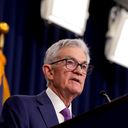Powell's rare TV moment: Fed chair urges patience with high interest rates

Federal Reserve chair Jerome Powell asked Americans to be patient as the effects of high interest rates ripple through the economy, while noting he still anticipates multiple interest rate cuts this year.
Why it matters: In a rare television interview with CBS' "60 Minutes," Powell acknowledged the side effects of the Fed's inflation-fighting efforts in recent years have resulted in difficulties for prospective homebuyers.
- But Powell, who said the central bank was debating when to lower interest rates, underscored the importance of making sure inflation is defeated.
What they're saying: It's important "particularly for younger couples starting out who may not have great financial means, that we succeed in this effort," Powell said on "60 Minutes."
- "We will do so. But what that means is that interest-sensitive spending like mortgages and buying, you know, durable goods and things like that, that's going to be expensive for a while," Powell said.
- "But this is all part of getting back to a place of price stability when interest rates can be low again on a sustainable basis."
The intrigue: Powell said "yes" when CBS' Scott Pelley asked him whether he wanted Americans to have patience.
- "I think people have been patient and have been through a pretty difficult time. And I think now we're coming through that time and starting to feel a little bit better about things," Powell said.
- He said that for the Fed to get inflation down, "interest-sensitive areas, particularly housing are ... a good example of the kinds of things that do slow down when rates go up."
Zoom out: The average mortgage rate was 6.6% as of last week, according to Freddie Mac — down from the recent peak of nearly 8% at the end of last year on the anticipation the Fed will soon cut rates.
- But it's still well-above the rock-bottom levels during the height of economic lockdown as the Fed sought to rescue the economy from the pandemic-shock.
- Since the Fed's historic interest-rate hiking campaign, homebuyers have faced a double-whammy of high borrowing costs and high housing prices.
Of note: Powell also told "60 Minutes" that Americans shouldn't expect prices for a slew of goods or services to drop lower.
- "The prices of some things will decline. Others will go up. But we don't expect to see a decline in the overall price level," Powell said.
- Powell said high prices for "basic necessities" explains why Americans have been "relatively dissatisfied with what is otherwise a pretty good economy."
What to watch: In the interview, Powell said the central bank would likely still slash rates at least three times this year — a projection indicated in forecasts released in December.
- "[N]othing has happened in the meantime that would lead me to think that people would dramatically change their forecasts," Powell said.
Yes, but: The big question on the minds of economists and financial market-watchers is when the first rate cut will occur. Last week, Powell told reporters after the Fed's policy meeting that an interest rate cut in March looked unlikely.
- In the interview with "60 Minutes" — recorded one day after those comments — Powell doubled down on that statement.
- "We've said that we want to be more confident that inflation is moving down to 2%," Powell said. "[I]t's not likely that this committee will reach that level of confidence in time for the March meeting, which is in seven weeks."
Where it stands: The interview was recorded before the public release of the January jobs report that showed the economy created a stunning 353,000 jobs.
- That data may give Fed officials even more hesitancy to lower interest rates soon, for fear that a booming labor market could keep inflation high.
Between the lines: Powell told CBS that "weakness in the labor market" — which, so far, there is little sign of — and "inflation really persuasively coming down" would make the Fed want to cut interest rates sooner.
- "The kind of things that would make us want to move later would be if inflation were to be more persistent, for example," Powell added.